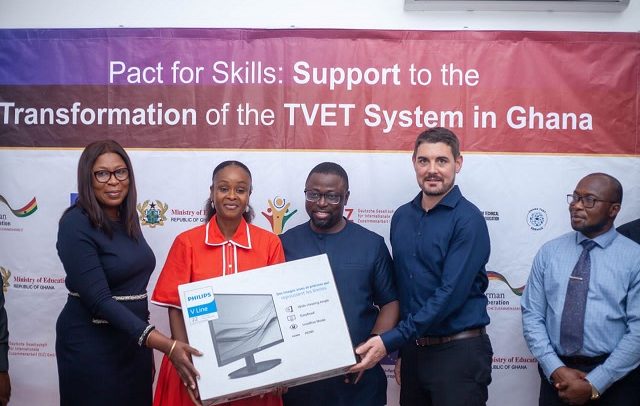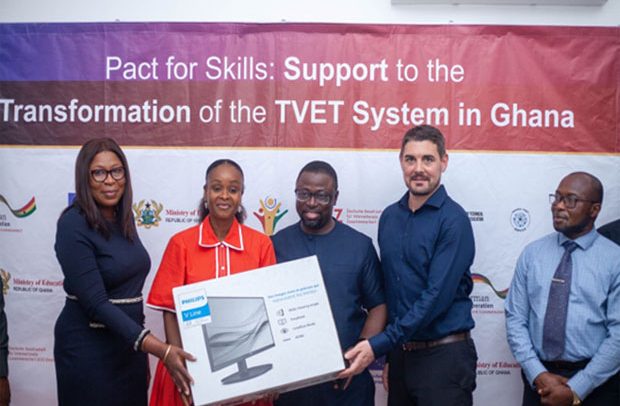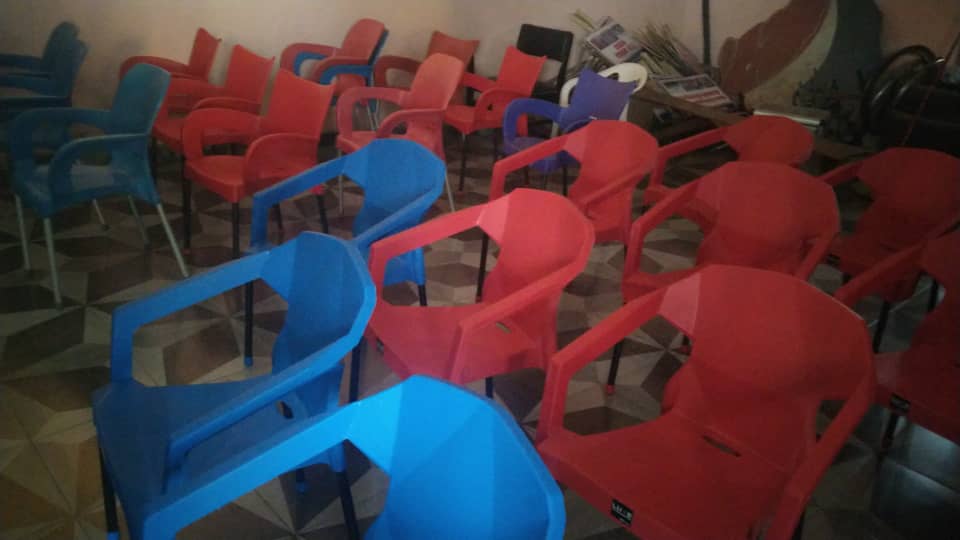
Presentation being made by officials of GIZ to officials of SSBs after the forum in Accra.
THE GERMAN Cooperation (GIZ), through its pact for skills project, has made a donation of some critical office equipment and a Secretariat to the Sector Skills Bodies (SSBs) in Accra.
The items donated include 13 desktop computers, a desktop organiser set, a steel cabinet, a laser printer, laptop computers, a projector, and a Bluetooth speaker, among others.
Speaking at a forum organsied by the Commission for Technical and Vocational Education and Training (CTVET), in partnership with the GIZ, Ramona Simon, Deputy Head of Development Cooperation at the German Embassy in Ghana, stressed that the German government’s investment in TVET initiatives in the country is a reflection of its conviction to transforming potential of skills development to improve communities, empower individuals, and contribute to national prosperity.
She underscored the need for collaborative efforts to enhance skills development, saying Germany acknowledges the critical role TVET plays in promoting economic growth.
“By partnering with Ghana, we aim to create a workforce that meets the evolving demands of the global economy, and we are proud to be at the forefront of initiatives that support nations in developing robust and responsive TVET systems,” she stated.
During a panel discussion on the theme, “Industry and Skills Development, and Future of Work and Decent Work: Role of Industry”, the panelists advocated for the development and enforcement of standards in the Technical and Vocational Education and Training (TVET) space to produce quality workforce and transform the world of work.
The panelists, comprising of Madam Linda Yaa Ampah, Chief Executive Officer (CEO) of Cadling Fashions and KAD Manufacturing Limited; Dr Kwasi Eyison, CEO of Pacific Tour and Pacific Solutions; Ethel Cofie, a Tech Business Leader; and Seth Ayim, a Construction Engineer held the view that, with the proliferation of TVET schools training in the country’s workforce in the areas of construction, fashion designing, cosmetology among others, having a standard certification for all students in the sector was the surest way to ensure professionalism and make them competitive on the global landscape.
Madam Gifty Twum Ampofo, Deputy Minister for Education in charge of TVET, stressed the importance of industry involvement in TVET to ensure maximum success, saying the government considered it crucial to forge mutually beneficial partnerships with the private sector.
The Minister who revealed the government’s vision to bridge the gap between education and industry needs said, the government, in collaboration with Germany, had invested $119,000 in completed projects, with an additional €16 million fund under the Austrian government for the upliftment and upgrading of technical institutions.
“Through initiatives like apprenticeship, curriculum development, and skills gap analysis, the government aims to create a symbiotic relationship that benefits both students and employers,” she intimated, adding, “We are committed to making TVET education a global competitor.”
Madam Twum-Ampofo called on the private sector and industry players to support the government’s efforts at placing TVET at the center of training the next generation of the country’s labor force.
Operating under the Commission for TVET, the SSBs are made up of related industries that come together under a common structure to drive growth and competitiveness across the sector by focusing on the exploration of business opportunities, innovation, and capacity needs within the sectors.
The Pact for Skills project is a four-year project to support the TVET sector.
BY Nii Adjei Mensahfio



















Facebook
Twitter
Pinterest
Instagram
Google+
YouTube
LinkedIn
RSS